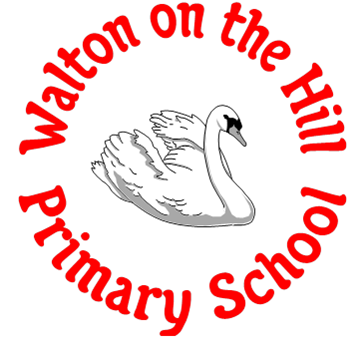Early Years Foundation Stage (EYFS)
Overview
The Early Years Foundation Stage (EYFS) sets out the learning, development and care of your child from birth to 5 years old. At Walton on the Hill Primary, our Cygnets (reception) class follows the EYFS curriculum.
Language is central to learning in our EYFS. We develop children’s spoken language, vocabulary and listening throughout the day. Reading is daily and varied, through whole class story times, group and 1:1 reading. Texts are chosen to link with the curriculum, spark interest and build progression. Children also explore poems, rhymes and non-fiction to enrich imagination, vocabulary and comprehension.
Through Talk for Writing, children internalise language patterns, extend vocabulary and gain confidence as storytellers and writers. A language-rich environment supports ambitious word learning, enhanced by our Speech and Language programme, where every child is screened and offered interventions to close gaps quickly.
Guided by the Strong Foundations recommendations for the first year of primary school, we make key knowledge and skills explicit, provide frequent practice until fluent, match teaching to prior knowledge and act swiftly on assessment. This ensures children build secure foundations for later learning.
How children learn
Reading, including phonics, Mathematics and Writing are taught daily using direct, whole-class instruction. This learning is then consolidated throughout the week during our learning activities and Discovery time. We use Monster Phonics, our validated phonics programme, to teach children to read and write successfully. Pupils will read multiple times throughout the week using decodable books that match the sounds and words they have learnt. Interventions are used across all areas of learning to support children to make accelerated progress and close any gaps that have been identified.
Our EYFS curriculum
Underpinned by the DfE’s Development Matters and Birth to 5 Matters, our curriculum has been created to lay the foundations that children will build on, throughout their time at Walton. It prepares them for Swans and goes above and beyond the statements in the EYFSP, being broad and ambitious, focusing on learning step-by-step. It is delivered through high-quality interactive whole-class carpet times and specific planned group activities. Careful thought has gone into the beginning and end of each day, snack times and lunchtime, hygiene routines, tidy-up time and when transitioning around the school for different parts of their learning. Rules, routines and expectations of learning are quickly set through the ‘Walton Way’, which will enable children to be successful throughout their schooling. All of these add to preparing the children for Swans, the timetable throughout the year increases the adult led foci and whole class direct teaching to ensure they are prepared for the transition. In addition, we provide opportunities for children to visit Swans, meet their teachers and spend time in the whole school break-times.
Support for all
Our curriculum offer supports all children to thrive, particularly those requiring extra support to achieve expected outcomes. Targeted interventions are provided through 1:1 and focus groups, including additional phonics, daily readers, writing, mathematics, fine motor skills and a speech and language programme. From entry to EYFS, children are baseline assessed for speech and language, grouped by need, and supported with interventions several times per week, alongside daily access to language-rich opportunities.
We also provide enrichment support, recognising that our children come from diverse backgrounds with different levels of prior experience. Our reception offer ensures all children access the essential knowledge needed to become educated citizens, preparing them for the future. This includes trips and visits to Painshill Park and Nower Wood, as well as hands-on experiences such as baking, smoothie-making, gardening, posting letters and more. In addition, children benefit from visits from the fire and police services, who help bring real-world learning to life. Parents are also welcomed into school to talk about their own jobs, offering role models and broadening children’s understanding of different careers.
Our EYFS learning environment
Our learning environment is structured and organised, it is planned for and is adapted throughout the year, continually extending the children through alternative provision and enhancements. We provide a variety of open-ended materials to enhance pretend and dramatic play. This nurtures their creativity and fosters children’s relationships and communication. High-quality interactions enable the children to develop their language and ideas, to think critically, problem-solve and reflect. We ensure children have ‘in-depth’ learning experiences where they can be deeply involved and immersed in their activities and their learning is then extended further by adding new resources or through stories, songs or information books. Our children are engaged with the natural world. For example, being gardeners in their own outdoor area or visiting rich outdoor environments, such as Nower Wood, as well as the local woodlands and green spaces we use for Outdoor Learning School sessions.
Continuous provision
Continuous provision describes all the different areas which are available for the children to use every day, during our Discovery time. Within each of these areas of provision there is a core range of resources that children use all the time, throughout the whole year. This is planned for and involves considering the classroom layout and resources that enable staff to offer a breadth of learning possibilities. Carefully planned continuous provision enables children to learn skills, will challenge their thinking and help them to embed concepts. It also provides the context for a variety of learning conversations between children and adults with rich opportunities for modelling and extending speech and vocabulary, resulting in a range of high-quality interactions. It is within this learning environment that the children will also develop key learning attributes. The environment impacts the children’s engagement, independence, collaboration, self-confidence and resilience and curiosity. Enhancements are then added to the provision throughout the year to help develop learning over time or in line with particular themes and topics. This enables children to make connections and develop deeper understanding.
